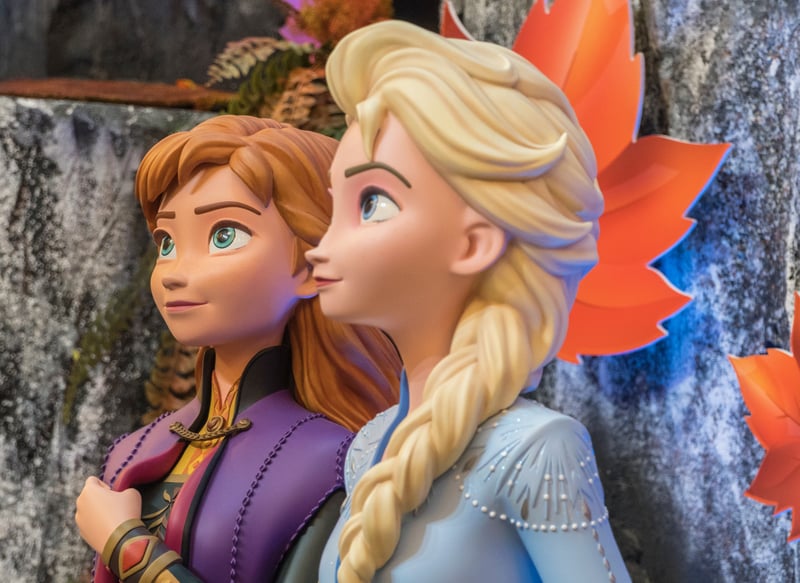Get Healthy!

- Sarah D. Collins
- Posted September 13, 2023
Disney Princesses: Are They Good or Bad for Your Child's Self-Image?
For parents worried about how Disney princesses might impact their child's self-image, a new study is saying, "Let it go."
"In children's media, about 60% of the characters are men and boys, they're male. And Disney princesses are probably one of the more visible and more well-known examples of media, made for children specifically, that's focused on female characters and women's stories,"said study author Jane Shawcroft, a doctoral student researcher at the University of California, Davis.
"And so even though Disney princesses get criticized a lot for being really thin or for being really heavily gender stereotyped, we wanted to think about "¦ the nuance there and does this affect children, given the context of the broader media climate,"she added.
Specifically, researchers asked whether the body size of each Disney princess affected kids' body esteem and gendered play behavior. These included the oldest and newest generations of princesses, who were coded into thin, average, and above average/heavy body categories. For example, Snow White was "thin,"while Moana was "average."
The team found that children whose favorite princesses had an average body size, like Moana, had higher body esteem a year later and were also more open to different types of gendered play, regardless of their own gender. Notably, kids preferring a thin princess did not seem to change children's body image or gendered play.
"Girl play tends to be more gentle. It's more emotional, there's a lot more pretend play, so this is like playing with dolls or playing house,"Shawcroft explained. Conventional boy play is "more rough-and-tumble play, so pretend fighting or wrestling, and it also tends to be less emotional."
A mix of both types of play are crucial for children's development because they help develop different types of skills, she added.
In total, 340 children and their caregivers were selected from an ongoing study on kids' development as it relates to entertainment, called Project M.E.D.I.A. At 3 years old and again at 4 years old, caregivers were asked about how much their children liked or felt good about their bodies. They also were asked about children's traditionally masculine or feminine play, based on which toys they preferred.
Elsa from Frozen was by far the crowd favorite, at around 53%, followed by Moana from her self-titled movie, at around 21%. However, the researchers noted it's important to keep in mind that preferences of these princesses instead of, say, Pocahontas or Belle, might be because the first two are more recent.
However, 137.7 million households subscribed to Disney+ in 2022, according to Statista, with many of the subscribers being families with young children. So, they would have as equal access to Mulan and Jasmine as they do to Tiana and Merida.
How the kids played make-believe princesses was also an important indicator. Pretending to be Moana over Cinderella, for example, led to engaging in more active play.
The findings were recently published online in the Psychology of Popular Media.
Dr. Benjamin Nwosu, a pediatric endocrinologist at Northwell Health in New Hyde Park, N.Y., said more active characters for children also greatly benefits their physical health.
"It's important for media to show things that will help us as endocrinologists fight childhood obesity. We want active models to be shown,"he said.
Nwosu also noted some of the study's limitations, including a lack of racial diversity, analyzing toddler behavior through the lenses of their parents' eyes, lack of a control group and the skewing of favorites to Elsa and Moana.
Still, Nwosu and his Northwell colleague Dr. Victor Fornari, a child psychiatrist, think it's important to examine the influence that media has on children.
"I think most people are dissatisfied with their body. If you ask people you know, 'Do you like the way you look,' most people, including kids, would say, I feel fat or I wish I was taller,"Fornari said. "There's no question that media and social media has a very powerful impact over children and their behavior."
More information
For more on children's viewing habits, visit Common Sense Media.
SOURCES: Jane Shawcroft, PhD student, department of communications, University of California, Davis; Benjamin Nwosu, MD, FAAP, professor, pediatrics, Zucker School of Medicine at Hofstra/Northwell, chief, endocrinology, Cohen Children's Medical Center of New York, New Hyde Park, N.Y., and director, Children's Diabetes Center; Victor Fornari, MD, chief, child and adolescent psychiatry, Long Island Jewish Medical Center, Glen Oaks, N.Y., and professor, Donald and Barbara Zucker School of Medicine at Hofstra/Northwell, Uniondale, N.Y.; Psychology of Popular Media, Aug. 24 2023, online

